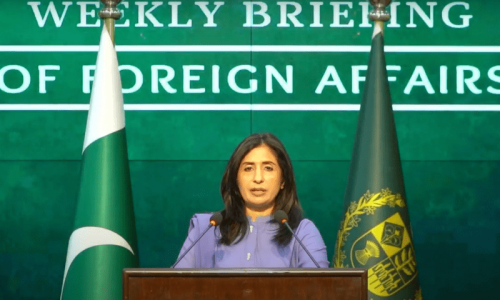PAKISTAN must devise a new counterterrorism paradigm of pursuit, response, dialogue, and community engagement. A clear threat perception is the most essential component of any counterterrorism strategy based on knowing one’s enemy.
In the realm of terrorism in Pakistan, multiple actors are operating with different agendas — from separatism to toppling the system. Many groups believe in a Sharia-based system or a Taliban-like regime in Afghanistan. The separatist groups are a primary threat to the state, as their ambitions are apparent. Groups with religious credentials, despite their extensive terrorism campaigns, are vague on the threat radar of state institutions. These institutions believe that such groups can be countered by defusing the power of their religious narratives and engaging resources closer to them, including tribal elders and religious scholars.
A debate on the newly announced counterterrorism campaign Azm-i-Istehkam is ongoing; little is known about the plan’s contours, except for a few press releases issued by state institutions. These releases highlight the campaign’s purpose as decisively defeating terrorism and extremism using the country’s military, diplomatic, legislative, and socioeconomic resources. When the decision was made during a meeting of the Central Apex Committee of the National Action Plan, chaired by Prime Minister Shehbaz Sharif, opposition parties, mainly from KP, denounced the operation and forced the state institutions to provide several explanations. However, there is little doubt that the Chinese factor was the primary motive for the operation.
China has been very apprehensive regarding security for its nationals and insisted on concrete measures to improve measures for their safety. The government initiated a few initiatives to satisfy China — the announcement of Azm-i-Istehkam was at the top of the list. The initial impression was that the state was going to launch a significant surgical operation against the terrorists. The federal defence minister strengthened this impression when, in his interaction with the media, he did not rule out cross-border attacks to hit TTP hideouts.
Any attempt to initiate negotiations with the TTP would be a significant blow to the country.
Of late, however, news reports, mainly in the Urdu press, have given the impression that the state is ready to negotiate with the terrorists again. Media reports categorically state that the federal government has decided to initiate a national dialogue to eliminate terrorism and extremism. Under Operation Azm-i-Istehkam, 30 per cent of actions will be operational, while 70pc will focus on dialogue and other measures.
State institutions have been promoting the impression for the last two years that they are not negotiating with the TTP. The state institutions cannot even think of initiating a dialogue with the current leadership of the Baloch insurgents, and the word ‘dialogue’ conveys only one impression: that the state institutions have reviewed or may review their decision to talk to militant groups. If the state initiates a dialogue with the TTP, it would be a significant blow to the country. The TTP is an Afghan Taliban proxy, and any negotiation with it would legitimise it as an actor. The TTP would see this as a major success and a sign of the state’s weakness. The TTP will not disarm itself and will not be ready to surrender. The dialogue would be a gain for the terrorists. If they return, they will encroach deeper into the country, triggering local disputes and imposing their brand of Sharia in areas under their influence.
The people of KP’s merged districts are suffering a lot as the state has failed to fulfil its commitments to mainstreaming these areas, and anger against the state institutions is at its peak. Despite all the hardships, the common man in these districts and other parts of KP is not ready to accept the return of the TTP. One must recall that it was the massive public protests that forced the state institutions to end dialogue with the terrorists. Any attempt to resume talks with the TTP will give the impression that the state institutions have always supported the notion of bringing back the TTP to the country and are just waiting for the proper moment.
Talks with the group would mean falling into the Afghan Taliban’s trap. The Afghan Taliban want to see their brothers in arms succeed in Pakistan. It would also demonstrate that Pakistan does not know its enemy well despite the suffering it has unleashed and that the state’s threat perception is inaccurate. Pakistan has to initiate a comprehensive dialogue with the Taliban regime so that it can help neutralise the TTP. And if there is an attempt to relocate TTP members and their families from the bordering areas to deep inside Afghanistan, Pakistan must back such an initiative and provide further support to disarm and mainstream TTP fighters in Afghan society.
If the Taliban refuse to cooperate, Pakistan must adopt a transparent approach and respond to the threat with full force. Meanwhile, state institutions have to initiate a dialogue with the marginalised population of the merged districts and Balochistan by giving them respect and initiating emergency development measures that are fully transparent and in partnership with local communities. State institutions must avoid strengthening those notorious for their corruption and abuse of power. There could be no better dialogue or community engagement than winning the hearts of the people of marginalised lands.
China is more concerned about the security situation in Balochistan and the regions of the Diamer district of GB and Kohistan, but the state has not announced any initiative for these areas. The security situation in Balochistan is delicate, and any military operation would have disastrous political implications. The state has to adopt a dialogue policy with Baloch civil society and bring transparency to governance and development projects. It may not totally eliminate the insurgents’ appeal, but could nurture a strong counter-narrative. For Diamer and Kohistan, the government must announce a weapon-free zone policy and announce incentives to de-weaponise the population of the regions.
The writer is a security analyst.
Published in Dawn, July 14th, 2024
















































